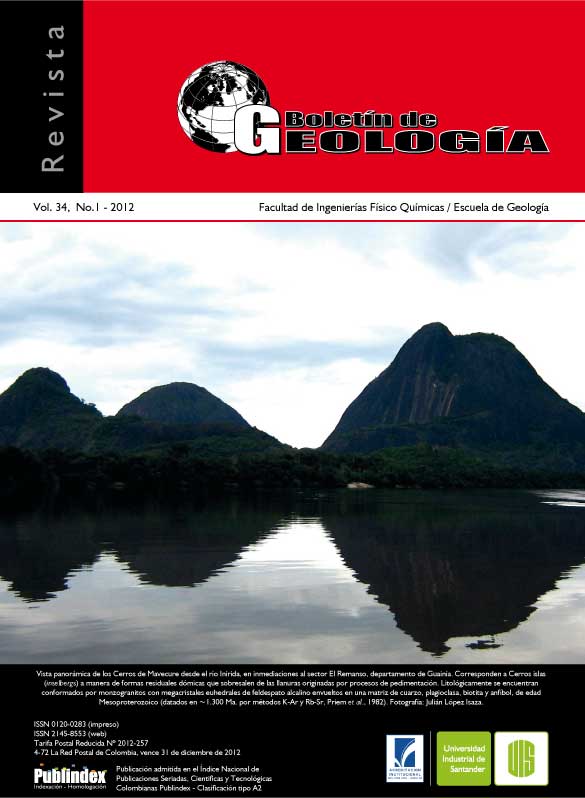PETROGRAPHIC CHARACTERIZATION, GEOCHEMISTRY AND AGE OF THE SAN JOSÉ DEL GUAVIARE NEPHELINE SYENITE.
Published 2012-08-24
How to Cite
Abstract
The San José del Guaviare Nepheline Syenite includes two rock bodies that crop out 20 km SW of the town with the same name. The first of these bodies, which had already been reported by Vesga and Castillo (1972), is exposed in the La Pizarra area. The second body, which had not been previously reported, occurs in the Las Delicias area.Petrographic characterization shows that rocks correspond to nepheline syenite, nepheline monzosyenite, and feldspar + nepheline granofels. The main minerals in the rocks are microcline + nepheline + plagioclase ± biotite ± arfvedsonite, and accessory phases include fluorite, sphene, apatite, garnet, zircon, epidote and calcite. Structures and textures are chiefly igneous in the la Pizarra body and mainly metamorphic (restitic) in the Las Delicias body. The geochemical character of the rocks is alkaline, and they correspond to within- the field of rocks formed in intraplate environment. The above features suggest that the San José del Guaviare syenite was formed by anatexis in a continental environment.U/Pb dating of zircon and 40Ar/39Ar (HS) dating of biotite indicates age 577.8± 6.3 - 9 Ma (Ediacaran) crystallization and 494±5 Ma (late Cambrian) cooling.
Keywords: Nepheline syenite, San José del Guaviare, Anatexis, Alkaline magmas.
Downloads
References
Cox, K., Bell, J., and Pankhurst, R. 1979. The interpretation of igneous rocks. George Allen and Unwin, London, 445p
Eby, et al. 1998. Geochemistry and petrogenesis of nepheline syenites: Kasungu-Chipala, Ilomba, and Ulindi nepheline syenite intrusions, North Nyasa Alkaline Province, Malawi. Journal of Petrology, 39(8): 1405-1421
Galvis, J., Hughet, A., y Ruge, P. 1979. Proyecto Radargrametrico del Amazonas, La Amazonía Colombiana y sus recursos. Instituto Geográfico Agustín Codazzi. p 33-91
Gansser, A. 1954. The Guiana Shield (S. America). Geological observations. Ecologae. Geologicae. Helvetiae., 47: 77-112, 12 fig., pl. VIII-XI
Maitra, M., David, J.S., and Bhaduri, S. 2011. Melanite garnet – bearing nepheline syenite minor intrusion in Mawpyut ultramafic – mafic complex, Jaintia hills, Meghalaya. Journal of Earth System Science, 120 (6): 1033-1041.
Maniar, P. and Piccoli, P. 1989. Tectonic discrimination of granitoids. Geologic Society of American Bulletin, 101: 635-643
McDonough, W.F., and Sun S. 1995. The composition of the Earth. Chemical Geology 120: 223-253.
Middlemost, E.A.K, 1975. The basalt clan. Earth Science Review, 11: 337-367
Pearce, J.A., Harris, N.B.W., y Tindle, A.G., 1984. Trace element discrimination diagrams for the tectonic interpretation of granitic rocks. Journal of Petrology, 25: 956-983.
Peccerillo, A., and Taylor, S.R., 1976. Geochemistry of Eocene Calc-alkaline volcanic rocks from Kastamonir area, Northern Turkey. Contributions to Mineralogy and Petrology, 58:63-81
Pinson, W.H., et al. 1962. K-Ar and Rb-Sr ages of biotitas from Colombia, South America. Geological. Society of America. Bulletin 73:907-910
Siivola, J., and Schmid R. 2007. List of Mineral Abbreviations. IUGS Subcommission on the Systematics of metamorphic Rocks. Consultado en marzo del 2011. Web (http://www.bgs.ac.uk./scmr/docs/papers/paper_12.pdf).
